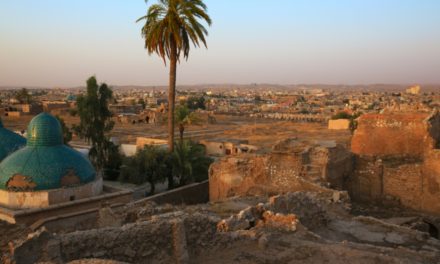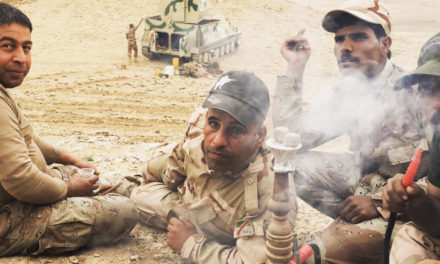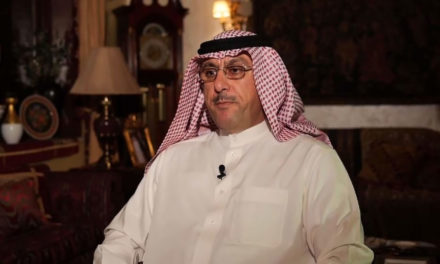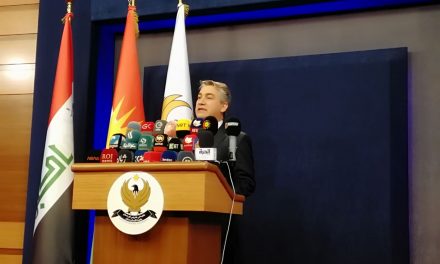(AP Photo/Nabil al-Jurani)
Emotions are tense as chaos engulfs Iraq once again. Various reports and narratives have emerged on global news and social media. In the age of fake news and politically charged narratives one may be led astray with ease, without intending to, nor even knowing that they have been misled. When it comes to the media analysis of events in Iraq, one Malcolm X quote comes to mind: “The media’s the most powerful entity on earth. They have the power to make the innocent guilty and to make the guilty innocent, and that’s power. Because they control the minds of the masses.”
Most media reporting the violent actions that occurred in Basra as the popular opinion of Iraqis, however the events that unfolded are not black and white and so there were politically motivated actions involved that do not necessarily reflect the popular opinions of Iraqis. The following are some points to consider as one analyzes the events that are occurring in Iraq:
- The last time Iraq faced uncertainty and chaos as it is facing today was four years ago after the 2014 election, when Daesh occupied a considerable chunk of Iraqi territory. It is no mystery that newly elected members of parliament in Iraq are struggling to form a government, inside and outside forces are attempting to either cause chaos or utilize existing chaos to further their agendas. One must be wary of media that are reporting the unfolding events occurring in Iraq and understand that the role of the reports on the news and social media that can support certain narratives and explanations of the events, deliberately leaving out other aspects and facts.
- The rightful protests in Iraq against government corruption have been on and off for the past few years. Corruption within the government and moral societal fiber of Iraq is the newest threat plaguing the country post-Daesh. The ability for Iraqis to come together once again to overcome this challenge will be the ultimate test for Iraq to ensure both stability and longevity of the nation.
- There is a clear shift happening in Ayatollah Sistani’s stances. This past election saw a new dimension of the Grand Ayatollah regarding his advice for Iraqis on how to vote. In the past the representatives of the Ayatollah issued statements on his behalf that Iraqis should get out and vote, however this cycle, the advice from the Ayatollah’s representatives was for Iraqis to either abstain from voting or vote for uncorrupt politicians. Furthermore, there is clear support for peaceful protests that didn’t change even after significant parts of the protests turned violent.
- The locals of Basra returned to protest for the past few months due to the deteriorating infrastructure that has caused the quality of water in Basra to reach poisonous levels. The infrastructure was not capable of cleaning the water that reached a poisonous level of salinity due to Iran dumping chemicals into Shatt al-Arab. Basra has three hundred thousand citizens that live below the poverty line and that includes one hundred thousand citizens residing in slums, lacking basic services. Basra, the country’s oil-rich province, produces 5 million barrels of oil per day (bpd). This production alone generates about $55 billion a year for Iraq. This does not include other revenues from natural gas and non-oil revenues like the ports, etc. As a source for the largest portion of the country’s GDP (80% of the nation’s oil revenues), it is unacceptable that Basra, which was once dubbed “the Venice of the East,” has subpar infrastructure, nor populations that live in poverty. Initial reports stated that over 100,000 locals have checked in to the hospital due to health complications from the water. Additionally, over 15 citizens have died due to water contamination. As a response, a State health official went on television to release a public statement proclaiming that the reports had been highly exaggerated and “only 1500 people have been poisoned”. The lack of empathy towards human health and life from the government official triggered the masses emotionally and that led to the chaos on the streets.
- The chaotic environment in Basra led to the burning of the Iranian Consulate in Basra. The Iranian Consulate was not the only target of chaotic attacks in Basra. Most government buildings including the provincial headquarter, most offices of political parties, hospitals, and other infrastructure in Basra were targeted by the out-of-control protests. The only political office that was not targeted by the protestors was the office of Sa’eroon coalition (Muqtada al-Sadr’s coalition). The protestors that targeted infrastructure in Basra were not part of the peaceful citizens protesting in the province. In fact, most of the leaders that led the peaceful protests vehemently spoke out against the targeting of all buildings in Basra.
The fifth point is crucial to understand and correctly analyze the unfolding events in Basra. Iran has a consulate in Basra due to the border that the province shares with Iran that foresees trade, ports, and tourism between the two nations. The narrative that Iraqis attacked the Iranian consulate because Iraqis hate Iran is a sectarian-charged narrative that is incorrect and highly exaggerated. Iraqis do not love or hate Iran any more or less than the other nations bordering Iraq. All nations surrounding Iraq have contributed towards keeping Iraq weak post-2003 and have economically benefitted from a weak Iraq, Iran included. However, Iran stood with Iraq when Iraq fought Daesh when most of Iraq’s allies like the United States under the Obama administration dragged their feet before sending support.
Iran fought Daesh with and within Iraq because Daesh is a common enemy to both states, and the territory that Daesh controlled within Iraq was close to borders with Iran. The general consensus of Iraqis after the defeat of Daesh is that they are thankful for Iran’s support in defeating Daesh. However, it is also important to note that Iraqis are hesitant of Iranian influence and interference within Iraq’s political affairs and do not want to become a political pawn for Iran, nor any other nation for that matter. Why is this important to note? Because once the protests lost control in Basra all attacks that followed were politically motivated, and not a reflection of the popular opinion of the natives of Basra that were protesting. This is why it is possible to argue that the Iranian consulate was not targeted because it was an Iranian mission, rather it was attacked due to protests losing control in Basra, and providing the opportunity and space for Iran’s rival to organize an attack against the consulate.
I believe that these notes are important for political pundits and other stakeholders to understand as they analyze the ongoing events that are unfolding in Basra as Iraq is attempting to form its new government. A prior article co-authored by Minna Jaffery and Daniel Benaim explains the struggles that are facing Iraq today best: “Iraq remains on the frontlines of three struggles: the fight against extremist groups like ISIS and its sure-to-come successors; the chance to prove that Middle Easterners of different sects and ethnicities can still peacefully coexist; and the struggle to help Iraq and other small nations protect their sovereignty and stability in a time of polarization and proxy war.” As Iraq fights its demons today it will once again show the world that diverse populations fighting to coexist together in peace is what gives a nation the most strength to endure even the most rigorous of adversities.

M Baqir Mohie El-Deen
M Baqir Mohie El-Deen is a Master of Public Policy candidate at Michigan State University specializing in International Development and recently completed an internship at the Embassy of Iraq in Washington D.C.










